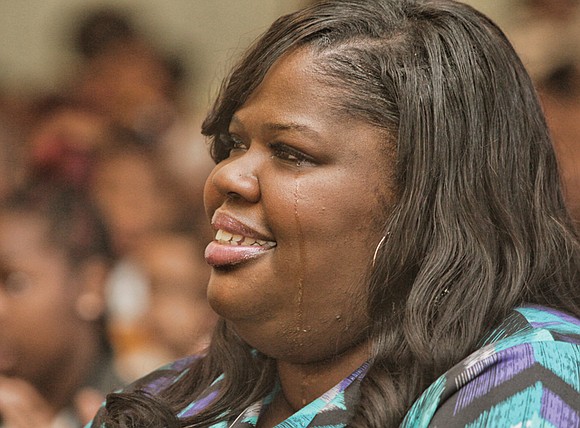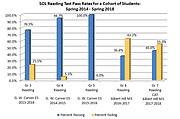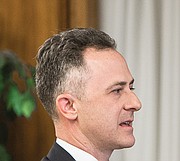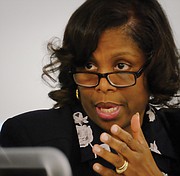Cheating at Carver
Ronald E. Carrington | , Jeremy M. Lazarus | 8/2/2018, 6 a.m.

During her six-year tenure as principal of George W. Carver Elementary School, Kiwana Yates allegedly orchestrated a major educational scam that ensured students scored high on state Standards of Learning tests even if they could not read well, write well and had not mastered arithmetic.
According to the state Department of Education, Ms. Yates organized a compliant group of at least five teachers to monitor the testing, and those teachers coached students and enabled them to change wrong answers.
The scheme fell apart — and Ms. Yates was removed as principal in June — when investigators confirmed earlier RPS findings that a majority of Carver students who had passed SOL tests with flying colors in the fifth grade were unable to pass tests in reading and math after moving on to Albert H. Hill Middle School.
Only about two in five former Carver students continued to do well at the middle school in those subjects, according to the findings.
While “testing irregularities” previously have been discovered at a few city schools, the Carver scandal hit home. For the past few years, Ms. Yates had been lauded as an educational savant because of the remarkably high pass rates that Carver students achieved.
During Ms. Yates’ tenure, Carver was named a National Blue Ribbon School, one of only seven schools in the state and 329 in the country to receive the honor.
“We take an all-hands-on-deck approach to educating our children,” Ms. Yates told the Free Press in 2015 in seeking to explain the school’s remarkable success educating students who came largely from low-income homes. “A kid is a kid, and it doesn’t really matter where they came from. It takes a level of excellence from the teacher and the ability of the school to meet the needs of each child.”
Since 2014 when pass rates at Carver began zooming upward, the results were largely taken at face value by School Board members, RPS administrators and even state officials who were eager to believe that Ms. Yates had a special touch.
In 2016, Carver test results showed virtually 100 percent of fifth-grade students passing SOL tests in reading and math, ranking the school as the best in the city and among the top schools in Virginia.
Carver may not be the only school that has been nudging results. John Butcher, who bills himself as the “Cranky Taxpayer” and whose hobby involves researching and creating graphs and charts from RPS educational data, issued his own report a few weeks ago suggesting that cheating might be going on at eight other Richmond elementary schools, based on their statistics. His findings have not triggered any additional investigations.
Even as the finger-pointing begins at those involved and questions are being raised about criminal charges and how to help the students who are now struggling in middle school, Richmond can take some solace that this is not unusual.
New Richmond schools Superintendent Jason Kamras arrived in February as a scandal erupted in Washington, laying bare a cheating scandal there and the false picture of educational success produced by a program of teacher evaluation that Mr. Kamras was instrumental in creating.
Cheating scandals are not unusual in an era when student results on high-stakes tests like the SOLs determine salaries, raises and promotions for teachers, principals and schools. Examples are legion, a computer search shows. Atlanta, Baltimore, Dallas, Houston and St. Louis are among cities that have experienced cheating scandals. So have Henrico and Chesterfield counties and Petersburg. The state reports 30 cheating scandals in the city and its two neighboring counties within the last five years.
The 34-page state report on Carver easily uncovered what was going on.
Students who were interviewed described the coaching. “When I raised my hand,” one student said, (the teacher monitoring the test) would tell me to keep going if I did it right. If it was wrong, she would tell me to try again.”
Another student said if she didn’t know the answer, “I’d raise my hand and ask for help. They would read to me. They would sit down next to me and read to me.”
“When I raised my hand and asked what a word meant, (a teacher) would help me. She would use the word in a sentence for me.”
Other members of the faculty described a system in which Ms. Yates sought to ensure that only certain teachers served as test monitors. Investigators were told that only certain people administered “the vast majority of the SOL tests.”
One teacher reported that “it’s like (there are) testing committees. They (certain staff) test everyone.”
Another reported: “Some people test. Some people don’t. We don’t talk about it.”
In the report, Dr. Yates denied that a small group of teachers handled testing. “Anybody in my building is able to administer tests. It doesn’t matter who tests them (the students). Anybody should be able to administer tests.”
However, Assistant Principal Fay Joyner told investigators that “Dr. Yates felt a group of teachers were not capable of testing — that they did not provide a positive outlook for students.”
Ms. Joyner described receiving text messages late in the evenings from Dr. Yates about making changes in the testing plan for the next day and spelling out which teachers would administer SOL tests.
Mr. Kamras triggered the investigation earlier this year when he advised the state Department of Education of concerns raised by School Board members and community members about Carver’s success.
VDOE officials said Mr. Kamras told them the biggest concern was the fact that Carver students were failing SOL tests at the middle school level. There also was concern that students at Carver who retested after failing the first time seemed to make huge gains in their scores on the second tests.
Ms. Yates’ control began to crumble May 24, when Mr. Kamras received tips from school insiders about testing irregularities and called on VDOE to investigate, resulting in the Carver’s 2018 results being thrown out and a new round of testing ordered for all of the students. The retesting took place in late June. Those results have not been publicly released.
In a statement, Mr. Kamras described the VDOE report as “deeply troubling. It presents abundant evidence of what amounts to cheating by a small group of adults on the SOL examinations in the past several years.”
He exonerated the students, stating they “did nothing wrong; they merely followed the instructions of the adults responsible for them.”
He also vowed to root out cheating and to have a working group recommend changes in policies and procedures to prevent any recurrence at Carver and all other city schools.
Along with members of the School Board, Mr. Kamras bemoaned the impact on the children and the fact that the cheating helped reinforce stereotypes that children of color who live in poverty cannot learn.
“High achievement at every one of our high-poverty schools is unequivocally possible,” said Mr. Kamras, who was a 2005 National Teacher of the Year. “I’ve seen it with my own students when I taught in a high-poverty neighborhood in Washington, D.C., and I’ve seen it in countless classrooms across the country — including Richmond.”
According to an RPS spokeswoman, Ms. Yates is still listed as an RPS employee, although whether she is on paid or unpaid leave is uncertain. Five teachers named in the state report also have been removed from Carver, according to sources, but Mr. Kamras would not comment on whether they are still employed by the school system.
The RPS process for separating an employee can take 90 to 120 days, if that process has been started.
With new classes set to start early next month, there are hopes that returning faculty and students can move on. “The misjudgment of a few should not allow us to paint a large brush of mistrust on all of the past gains made by Carver,” stated School Board Chair Dawn Page, 8th District.
Several School Board members worried that the cheating “has potentially caused lingering distrust by present and former Carver students of teachers, in particular, and adults, in general.”
Expressing his frustration, School Board member Jonathan Young, 4th District, said, “It is extraordinarily disheartening and disappointing that these teachers and a principal that were entrusted to be role models and lift up our children did everything but that.’’
“The worst thing we can do is feed the narrative that our children can’t excel,” Mr. Kamras said. “We know that is far from the truth. Our children deserve highly ethical and enriched learning with adults that demonstrate integrity.”
Tiawana Giles, previously an assistant principal at Oak Grove-Bellemeade Elementary, has been tapped to be Carver’s principal for the start of the 2018-19 school year.
School Board member James “Scott” Barlow, who represents the 2nd District where Carver is located, has been meeting with Ms. Giles on a weekly basis along with other community members to ensure that she gets off to a great start at Carver.
“What happened at Carver helped to perpetuate stereotypes about what children from low income families and children of color can achieve,” Mr. Kamras said at Monday’s press conference.
“Please use this as a wake-up call to support Carver and RPS. We need caring, responsible adults to get involved as much as ever,” he said.
“It’s going to require us to confront biases and stereotypes head-on to provide more and better support to our students and teachers alike, to be bold and innovative, to fiercely advocate for more resources, and to be unrelenting in the face of challenges ahead.”









